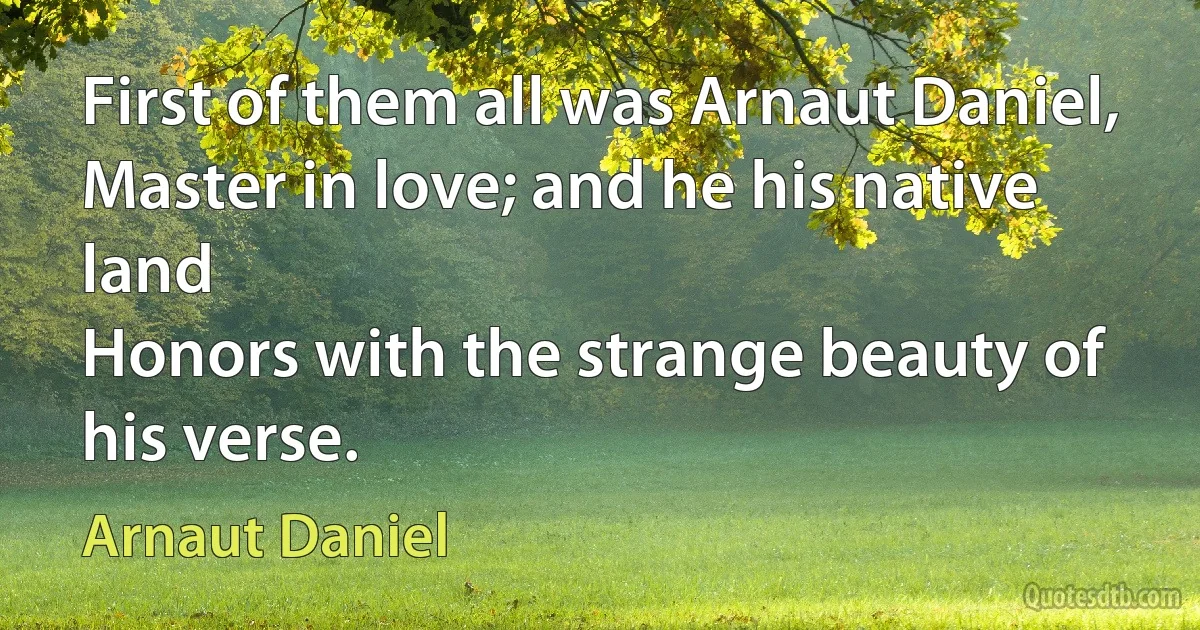Master Quotes - page 28
Chrétien is nothing if not versatile: popular, recherché, allusive, insistent, arch, naïve, racy and demure...He has a dramatist's flair for the handling of dialogue, a deft and economic way with characterization, the sharp confidence of the logician in his handling of rhetorical figures and the self-assurance of the entertainer in the deployment of humour (he is master of the verbal nudge). It is his essential vivacity that one misses most in his imitators.

Chrétien de Troyes
It was no further from the compromises of 1850 to the repeal of the Missouri bill in 1854, than it was from the annexation of Texas in 1845 to the compromises. Slavery had no reason to fear that it could not take one more step, and one more, every few years. If freedom will bear a pinch, it argued, it will bear a blow. If a blow, a kick. If a kick, we'll throw it and throttle it. The burglar who has quietly mounted one stair does not see why he may not mount the next. There is a risk; that is all. The master of the house sleeps quietly on. The burglar mounts another stair. Still the sleeper sleeps. Another. There is no motion yet. He mounts another. No reason for alarm. Hist! the last stair creeks ; the master awakes - springs to his feet - grasps his weapon - aims - fires. Do you think he will sleep again ? I don't believe he will.

George William Curtis
We are living in 1937, and our universities, I suggest, are not half-way out of the fifteenth century. We have made hardly any changes in our conception of university organization, education, graduation, for a century - for several centuries. The three or four years' course of lectures, the bachelor who knows some, the master who knows most, the doctor who knows all, are ideas that have come down unimpaired from the Middle Ages. Nowadays no one should end his learning while he lives and these university degrees are preposterous. It is true that we have multiplied universities greatly in the past hundred years, but we seem to have multiplied them altogether too much upon the old pattern.. [A] new university is just another imitation of all the old universities that have ever been. Educationally we are still for all practical purposes in the coach and horse and galley stage.

H. G. Wells
If you're afraid of black nationalism, you're afraid of revolution. And if you love revolution, you love black nationalism. To understand this, you have to go back to what the young brother here referred to as the house Negro and the field Negro back during slavery. There were two kinds of slaves, the house Negro and the field Negro. The house Negroes - they lived in the house with master, they dressed pretty good, they ate good because they ate his food - what he left. They lived in the attic or the basement, but still they lived near the master; and they loved the master more than the master loved himself. They would give their life to save the master's house - quicker than the master would. If the master said, "We got a good house here," the house Negro would say, "Yeah, we got a good house here." Whenever the master said "we," he said "we."

Malcolm X
Whoever enters the Way without a guide
will take a hundred years to travel a two-day journey.
The Prophet said "In this way you have no more
faithful companion than your works."
How can these works and this earning in the way of righteousness
be accomplished without a master, O father? Can you practice the meanest profession in the world
without a master's guidance?
Whoever undertakes a profession without a master
becomes the laughingstock of city and town.

Rumi
The most precise and complete formulation of the law of higher logic I find in the writing of Plotinus, in his On Intelligible Beauty. I shall quote this passage in the succeeding chapter.
I have called this system of higher logic Tertium Organum because for us it is the third canon - third instrument - of thought after those of Aristotle and Bacon. The first was Organon, the second, Novum Organum. But the third existed earlier than the first.
Man, master of this instrument, of this key, may open the door of the world of causes without fear.

P. D. Ouspensky
Ikenobo Sen'o, a master of flower arranging, once said (the remark is to be found in his Sayings): "With a spray of flowers, a bit of water, one evokes the vastness of rivers and mountains." The Japanese garden too, of course symbolizes the vastness of nature. The Western garden tends to be symmetrical, the Japanese garden asymmetrical, and this is because the asymmetrical has the greater power to symbolize multiplicity and vastness. The asymmetry, of course, rests upon a balance imposed by delicate sensibilities. Nothing is more complicated, varied, attentive to detail, than the Japanese art of landscape gardening. Thus there is the form called the dry landscape, composed entirely of rocks, in which the arrangement of stones gives expression to mountains and rivers that are not present, and even suggests the waves of the great ocean breaking in upon cliffs.

Yasunari Kawabata
However it may have happened, it is an excellent thing, and I do not like it the worse for its being so very triumphant a peace for France...The sense of humiliation in the Government here will be certainly lost in the extreme popularity of the measure...this rascally people are quite overjoyed at receiving from Ministers what, if they had dared to ask it, could not have been refused them at almost any period of the war. Will the Ministers have the impudence to say that there was any time (much less that when Bonaparte's offer was refused) when we might not have had terms as good? Bonaparte's triumph is now complete indeed, and, since there is to be no political liberty in the world, I really believe he is the fittest person to be the master.

Charles James Fox
Xenocrates the philosopher writes that at Athens out of all the laws of Triptolemus only three precepts remain in the temple of Ceres: respect to parents, reverence for the gods, and abstinence from flesh. Orpheus in his song utterly denounces the eating of flesh. I might speak of the frugality of Pythagoras, Socrates, and Antisthenes to our confusion: but it would be tedious, and would require a work to itself. At all events this is the Antisthenes who, after teaching rhetoric with renown, on hearing Socrates, is related to have said to his disciples, «Go, and seek a master, for I have now found one.» He immediately, sold what he had, divided the proceeds among the people, and kept nothing for himself but a small cloak. ... His most famous follower was the great Diogenes, who was mightier than King Alexander in that he conquered human nature.

Jerome
The ordinary man casts a shadow. In a way we do not quite understand, the man of genius casts light. Instinctively, we flinch from this light. We assure ourselves that genius must pay a terrible price. Often history bears us out: the creator, the supreme artist, the master of politics carries the scars of his greatness.

George Steiner
Fantasizing about action out there in the 'real' world, spinning dreams abut the secret centrality, about the occult importance of the labours in which he has interred his existence - labours that the vast majority of his fellow men would deem wholly marginal and socially wasteful if they knew of them at all - the pure scholar, the master of catalogues, can sup on hatred. At the ordinary level, he will exorcize his spleen in the ad-hominem nastiness of a book review, in the arsenic of a footnote. He will vent his resentments in the soft betrayals of an ambiguous recommendation or examination report and in the scorpion's round of a committee on tenure. The violence stays formal. Not, one supposes, in Professor Blunt.

George Steiner



